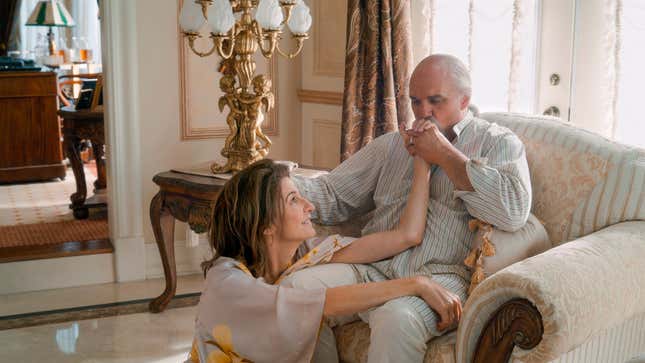‘Aline’ Presents Celine Dion Through the Looking Glass
In an interview, the biopic's director/writer/star Valérie Lemercier talks adapting Dion's life: “I wanted to make something with my heart."
EntertainmentMovies

You have heard that Aline is weird, and it is. Billed right on its poster as “a fiction freely inspired by the life of Celine Dion,” it’s a platform for the talents of French star Valérie Lemercier, who co-wrote and directed, and also stars as the pop singer Aline Dieu. At least part of what critics are responding to when they use words like “strange,” “oddity,” and “bizarre” in their reviews of the film (“Even now, I still can’t believe I have seen it,” wrote The Guardian’s Peter Bradshaw in his pan.) is a result of one of the most widely publicized aspects of the film: Lemercier plays Aline at every stage in her life, from toddler to middle age. In a Zoom conversation last month, Lemercier described to Jezebel a scene that ended up on the cutting room floor in which she played baby Aline “at six months old in a drawer with one tooth.”
“My producer cut it,” she explained. “But it was most bizarre at first.”
Lemercier acknowledged the weirdness of her film only sporadically, which seems right. As strange as it is to see Lemercier, who was 55 when she shot Aline, play a small child and teenager, the movie is steeped in the classic tenets of the biopic form. It compresses a life—not Dion’s life, but one that shares several of its beats—into two hours, sprinting from the rags of a life among 13 siblings in Quebec to the riches of international pop stardom. Aline leans heavily on melodrama, sometimes with a knowing wink (Glenn Medeiros’s adult contemporary treacle “Nothing’s Gonna Change My Love for You” blares as Aline unveils her new haircut in a slow-motion sequence), sometimes with an entirely straight face (strings weep along to a young-adult Aline’s pining for love). With Aline, Lemercier may have devised the most unconventional way to uphold convention.
To hear Lemercier tell it, it was all quite logical. She said that her French audience is used to seeing her play a little girl, something she’s done on television and in comedy shows. She’s loved Dion since her first hit in France, “D’amour ou d’amitié,” which Dion released in 1982, when Lemercier was 14. (“She had a strange face, strange teeth…everything was strange!” said Lemercier of Dion’s early days.) The genesis of her idea for a biopic-not-biopic of Dion dates back to the press cycle of Lemercier’s previous film, 2017’s Marie-Francine, during which she joked with an interviewer that her next project would be a movie about Dion. Afterward, her production designer Emmanuelle Duplay urged her to pursue the project and the joke turned serious.-

-

-

-

-

-

-

-

-

-

-

-

-

-

-

-

-

-

-

-

-

-

-

-

-

-

-

-

-

-

-

-

-

-

-

-

-

-

-

-










































